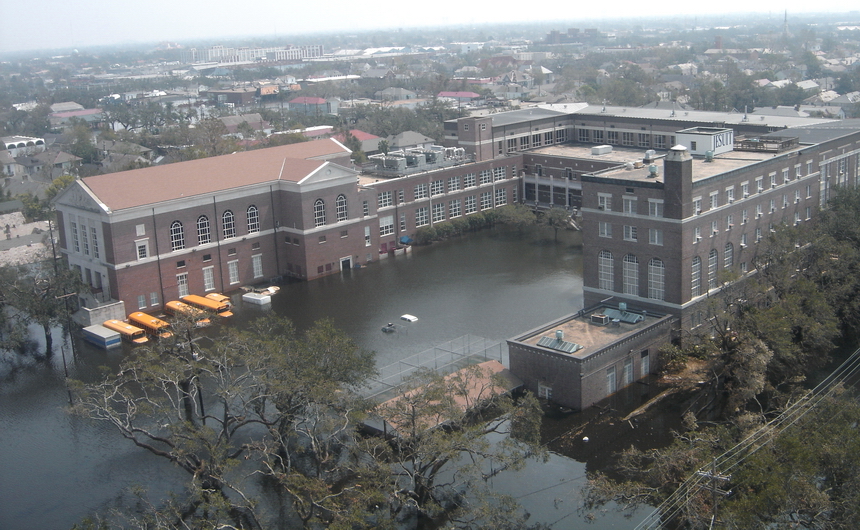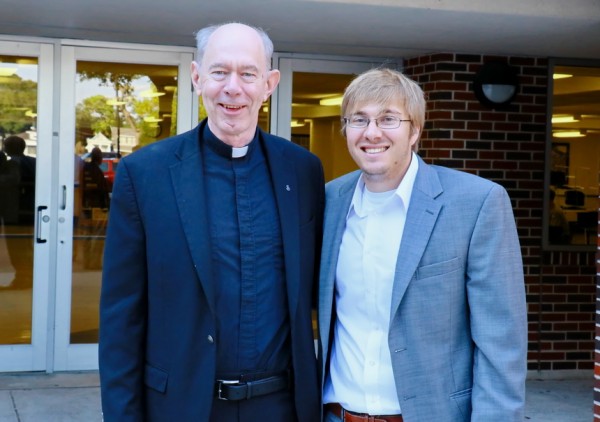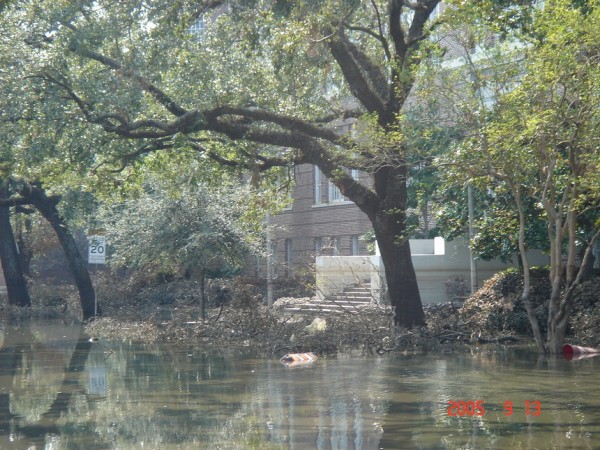When Remembering Katrina, Avoid Wallowing in Self-Pity and Focus on Gratitude
At Morning Assembly, Blue Jays Listen to Upbeat Talks by Jesuit President Fr. Anthony McGinn, S.J. ’66 and Alumnus William Stoudt ’07

The view of Jesuit High School from a helicopter passing over Mid-City when Katrina’s flood waters were just starting to recede.
It seems every time we turned on television or the radio this week, we heard about Katrina. The 10-year anniversary of the flooding of New Orleans and the challenges faced by its citizens to return and rebuild has naturally generated discussion and remembrances. Katrina was a momentous, historic, and life-changing event. It was a tragedy, lest we forget that almost 2,000 people died from drowning, exposure, heart attacks, and the like. Jesuit’s current students, numbering 1,420, ranged in age from three to seven or eight when the flood walls collapsed, inundating 80% of the city, including Mid-City. Jesuit and the surrounding neighborhood took on five feet of water. It was three weeks before most people could get back into the city to check on their properties.
In that amount of time, Jesuit had established a satellite school at Strake Jesuit in Houston for some 400 Blue Jays whose families evacuated to the west. The easy decision was made quickly: Jesuit would rebuild, of course, and the sooner, the better. Thirteen weeks later, Jesuit became the first flooded school in New Orleans to reopen when it welcomed a few hundred students back to campus the day after Thanksgiving. And, yes, there was a Thanksgiving drive on that Wednesday before the holiday in which Blue Jays delivered baskets of groceries to families in need. Renovation and construction continued at Jesuit until mid-2007. At the same time Jesuit was rebuilding and educating its students, many of our teachers and staff were coping with their own reconstruction problems: knock the house down or renovate? Sell to the Road Home and move somewhere else? Stay or go? Stressful times, indeed.
So, in this time of Katrina anniversary stories that media have dutifully reported via TV, radio, newspapers, social media, etc., Jesuit’s own remembrance was kept fairly simple: students heard two brief talks at Friday’s Morning Assembly. The first was from Jesuit president Fr. Anthony McGinn, S.J. ’66, who said we should all have the right attitude, the right tone when seeing these “remembrances.” A tone of gratitude. When you watch the video of Fr. McGinn’s talk, you will hear him mention four great aspects of the culture of New Orleans, one of which is self-pity.
“We can take all our tragedies in New Orleans and bemoan them and feel bad about it and blame others, and become very, very negative about ourselves and about others,” said Fr. McGinn. “Self-pity is a focus on powerlessness where we do not have the power and fall into blaming. We blame others. We blame our leaders. We blame our family. We blame our neighbors. Self-pity is a very, very destructive force. It leads to depression. It leads to anger.
“So I encourage you to develop your own self-pity detector – you can’t buy these at Home Depot. They come to you from self-awareness, from thinking about yourself and realizing when you’re falling into self-pity yourself. You will hear in these Katrina remembrances a ton of self-pity and blame. Unfortunately, it’s part of how human beings behave, especially human beings in our city because our tragedy gets distorted into self-pity. With your awareness and self-reflection, you can avoid that and detect that in yourself and avoid it. Don’t focus on what I lost; that is the focus on self-pity. Focus on whom I must thank, who is it that deserves my thanks, and extend that thanks to that person.”
One person who Fr. McGinn thanked was the second speaker at the Assembly. William Stoudt was a junior at Jesuit when Katrina struck. He ended up at Strake Jesuit for the first semester. He recalls an “uncomfortable feeling of helplessness” while in Houston that grew when he returned to New Orleans. He felt he was powerless as he watched people trying to rebuild. His life changed when he attended a meeting during lunch that sought Blue Jays who were interested in helping to rebuild the city. The group started to gut houses and Youth Rebuilding New Orleans (YRNO) was born. Stoudt talks about seeing, smelling and touching New Orleans in those early years. He devoted Saturday mornings for two years without a break going into homes that needed to be rehabilitated.
His days of service gave him a purpose and he became the executive director of YRNO, which is now a full-fledged non-profit in New Orleans. The organization has brought in 10,000 volunteers to rehab hundreds of homes over the years. His story inspires. It is one of the great legacies of Katrina.
Read More:
Fr. McGinn: Four Flaws of New Orleans


